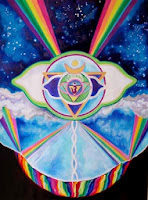 What is truth? How do we find truth? If we find it, can we communicate it?
What is truth? How do we find truth? If we find it, can we communicate it?According to Plato: When the mind's eye rests on objects illuminated by truth and reality, it understands and comprehends them, and functions intelligently; but when it turns to the twilight world of change and decay, it can only form opinions, its vision is confused and its beliefs shifting, and it seems to lack intelligence. (Plato, Republic)
To Spinoza, ultimate truth is the ultimate reality of a rationally ordered system that is God. To Hegel, truth is a rationally integrated system in which everything is contained. To Einstein, the truth of the Universe is human truth.
Modern day philosopher, Ken Wilber, believes that there is a nondual, absolute truth, that can only be accessed by Satori, and a relative or conventional truth, that is formed by our place in the nested hierarchy of being (each higher of which includes the ones beneath it, creating a series of nested holons.) Each
According to Wilber, the absolute is known only by a direct realization involving a transformation in consciousness (satori, sahaj, metanoia), and "what" is seen in satori cannot be stated in ordinary dualistic words, other than metaphors, poetry, and hints (if you want to know God, you must awaken, not merely theorize).
What do YOU think?




